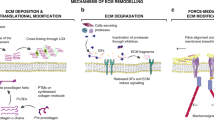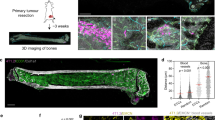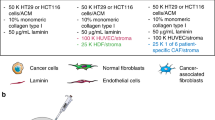Abstract
The co-injection of extracellular matrix components, such as Matrigel, with human tumour cells into nude mice has been reported to facilitate tumour formation and growth, but it is unknown whether such components exert similar effects on tumour progression and metastasis. Metastatic behaviour is known to be enhanced when tumour cells are implanted orthotopically, and it is inferred that full and efficient expression of this phenotype may involve some interactions with local connective tissue matrix. It was therefore decided to investigate whether manipulation of the mesenchymal environment by co-injection of extracellular matrix components, in the form of Matrigel, with human breast cancer cells into orthotopic or ectopic sites could augment their metastatic performance, as well as their growth at the site of inoculation. Standard aliquots of 10(6) cells of the polyclonal human breast carcinoma cell line MDA-MB-435, and of four clonal cell lines, two metastatic and two non-metastatic derived from it, were injected with and without Matrigel, orthotopically or subcutaneously into nude mice. The latent period of tumour formation at the inoculation site as well as final tumour size and metastatic performance at autopsy, 140 days after inoculation, were then assessed. The prevalence of metastasis of the parent, polyclonal, cell line and of its metastatic clones was increased if the cell inoculum was mixed with Matrigel. Non-metastatic clones were not induced to become metastatic by this treatment, but local tumour growth at the site of inoculation was enhanced in all experimental groups receiving Matrigel. Orthotopic inoculation acted synergistically with Matrigel to maximise both tumour growth and metastatic behaviour. The composition of the local extracellular matrix at the site of tumour growth influenced expression of the metastatic phenotype by cells which are constitutionally capable of this behaviour, but did not induce it in ones which are not. Previous reports that local tumour growth is facilitated by enrichment of the mesenchymal matrix are confirmed. The mechanisms by which such effects are exerted are worthy of study, to ascertain whether they might be subject to clinical manipulation designed to retard tumour growth and dissemination.
This is a preview of subscription content, access via your institution
Access options
Subscribe to this journal
Receive 24 print issues and online access
$259.00 per year
only $10.79 per issue
Buy this article
- Purchase on Springer Link
- Instant access to full article PDF
Prices may be subject to local taxes which are calculated during checkout
Similar content being viewed by others
Author information
Authors and Affiliations
Rights and permissions
About this article
Cite this article
Bao, L., Matsumura, Y., Baban, D. et al. Effects of inoculation site and Matrigel on growth and metastasis of human breast cancer cells. Br J Cancer 70, 228–232 (1994). https://doi.org/10.1038/bjc.1994.284
Issue Date:
DOI: https://doi.org/10.1038/bjc.1994.284
This article is cited by
-
Ionizing radiation abrogates the pro-tumorigenic capacity of cancer-associated fibroblasts co-implanted in xenografts
Scientific Reports (2017)
-
Results from 11C-metformin-PET scans, tissue analysis and cellular drug-sensitivity assays questions the view that biguanides affects tumor respiration directly
Scientific Reports (2017)
-
Neoplastic transformation of porcine mammary epithelial cells in vitro and tumor formation in vivo
BMC Cancer (2015)
-
Noninvasive Imaging of Liposomal Delivery of Superparamagnetic Iron Oxide Nanoparticles to Orthotopic Human Breast Tumor in Mice
Pharmaceutical Research (2015)
-
Inhibition of transforming growth factor-β-activated kinase-1 blocks cancer cell adhesion, invasion, and metastasis
British Journal of Cancer (2012)



